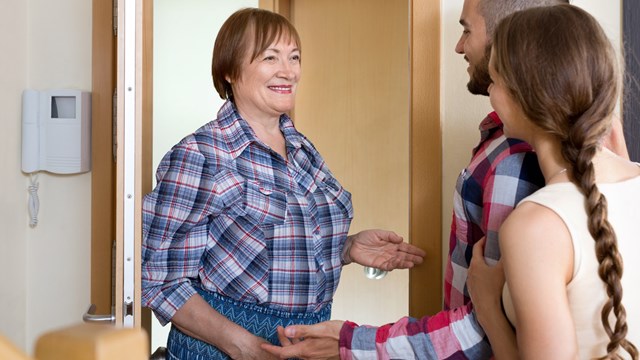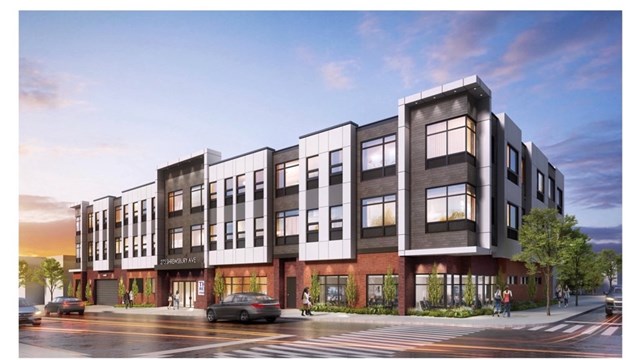Homeownership is a long-term commitment for most. In the context of a multifamily community like a condo or co-op, it’s not unusual for many owners and shareholders in the building to have purchased their units around the same time in early adulthood or middle age, raised their families there, and stayed put after the kids have launched. In cases where aging-in-place senior residents make up a majority of the building or HOA’s population the property becomes what’s known as a naturally occurring retirement community, or NORC.
The more common scenario is for the aging segment of a building’s population to represent a significant minority—one with its own needs and challenges, which often require some special consideration and accommodation from boards and managers.
Unique Challenges
“In New Jersey, we’ll often have situations with elderly folks who are living alone, and they’re potentially being neglected or cannot take care of themselves,” says Scott B. Piekarsky, a principal with law firm Offit Kurman in Hackensack. “Or it may be a behavioral health issue on top of a medical issue.
According to Susan Birenbaum, LCSW, a New York-based therapist whose firm offers co-op/condo advisory and psychotherapy for aging adults and their families, as this cohort of residents has aged, “It’s of course more common for them to live with health challenges [and] illnesses ranging from heart problems to diabetes to mobility limitations, cognitive decline and dementia. Day-to-day housekeeping tasks may be neglected as their ability to manage cleaning deteriorates.
“There are other behavioral changes that can be a nuisance at best, and a hazard to the resident and neighbors alike at worst,” Birenbaum continues. “Individuals who used to keep a neat apartment may exhibit hoarding behaviors, creating problems with odors, pests, and clutter–as well as a fire hazard for the whole building, and dangerous conditions for emergency personnel who may need to enter their apartment during a crisis. Residents with dementia may also leave the gas on, or candles unattended, or may smoke in bed, which again puts them and their building at risk.” They also may exhibit troubling behaviors, such as wandering public areas of the building in inappropriate clothing, shouting, or harassing neighbors and staff. “While these outbursts may not present a physical danger,” says Birenbaum, “they are certainly disruptive, and can be upsetting for everyone involved, including the resident him–or herself.”
Respect Your Elders
When an older neighbor is struggling with one or more of these issues, what responsibility–moral, legal or otherwise–do co-op, condo, and HOA communities have toward that community member? Is that responsibility different in any way from the rest of the resident population?
In short, no, says William McCracken, a partner with New York City-based law firm Moritt Hock & Hamroff. That being said, “By law, every building should be equipped to handle the needs of elderly and disabled residents. Therefore, it helps to know the building population well enough to cater to specific needs and issues. It’s also useful for the building managers to be familiar with social service programs available to residents in their particular area, and to have ongoing working relationships with the people running them.”
Matthew Gaines, a partner at Marcus, Errico, Emmer, & Brooks, a law firm located in Braintree, Massachusetts, elaborates: “The short answer is that condo communities that have an elderly population by default are not nursing homes or assisted living facilities,” he says. “They are still condominium associations. They are not and should not become the caretakers for these people. To be fair, on the other hand, the board and the property’s management want to maintain a harmonious community. That harmony would include protection, wellness, and safety for residents. Therefore, there are things they must do that other condo communities with a younger residency might not.”
Birenbaum concurs. “Empathetic as employees may be toward people they’ve known for years–even decades–as nice neighbors, it is not their responsibility to care for the shareholder.”
So, while there is no concrete legal obligation for boards to provide special consideration to elderly residents outside of those required under laws such as the Americans with Disabilities Act (ADA), there is a moral imperative to show care and concern for one’s neighbors and constituents.
Practical Matters Matter
An example of that care and concern is helping older residents cope with maintenance or repair projects that may impact their daily lives more profoundly than that of their younger or more able-bodied neighbors. Even from a purely practical point of view, communities, boards, and their managers need to take the needs of elderly residents into consideration when planning maintenance work or larger capital projects that might disrupt daily life for all residents, but that could represent major hardships for those who are elderly and/or have mobility challenges.
For instance, during the replacement of the single elevator in the author’s own building, neighbors organized to help ease the impact of the six-week project on the approximately 10 elderly residents in the building. Chairs were placed at the landings next to the stairs on each floor to provide a break for those climbing to reach higher floors. A committee of neighbors also organized daily shopping trips on behalf of older residents who might have a hard time getting to and from the market. While the elevator replacement was difficult for these elderly shareholders, the care and consideration given by their neighbors was of critical importance in getting through the project.
Setting a Workable Policy
There are many angles for boards and management to consider even when setting unofficial policy with regard to elderly residents. Policies must be fair and must not cross lines of liability and responsibility. And the issues go beyond access and mobility. One resident of a condominium complex in south Florida with a diverse range of ages told CooperatorNews that they have a group of resident volunteers who go door-to-door to check on elderly neighbors every day after 10 AM. If a resident doesn’t respond, management is alerted to do a more thorough wellness check on the resident to make sure everything is okay.
More than just a matter of policy, paying attention to sudden absences, or changes in an older resident’s usual routine is just good neighborliness—and can even save lives. Dan Wollman, the CEO of Gumley-Haft, a real estate management firm in Manhattan, says, “I have a building I manage where one of the residents wasn’t seen for a couple of days. After three days, the super called and the neighbors checked—turns out the resident was very ill and needed help. It was definitely a good thing they checked.”
That being said, Wollman goes on to note that “We need to keep in mind that a [condo or co-op] building isn’t a nursing home. We’re not an assisted living facility, either. The sad truth is that it’s not our job. On the human side, we want to be thoughtful and check in on [residents] because we want to build community, because community is what shared interest living is about–but we simply don’t have the mechanism to check in on all elderly residents every day. So there has to be some balance between the two. It can’t all be left up to the building staff. They aren’t trained care professionals, and it’s not what we pay them to do. It’s a very complicated issue.”
“Every county in the state has something called adult protective services, or APS,” says Piekarsky. “We’ll call their office in these situations to see if they can look into things. And certainly, if there are other family members available locally, we’ll reach out to them to intervene and indicate that there’s an issue.
“In New Jersey there is also mandatory alternative dispute resolution (ADR),” he continues, “so we might use that process to sit down with the resident, approaching them in a kind and relaxed manner, and engage a dialogue, assuming that they are both cognizant and cogent enough for that process to have merit.
Birenbaum concurs. “Often the board, managing agent (if there is one) and the co-op’s legal advisors don’t know what to do in order to support the residents and get them the help they need,” she says. “They may decide to write a letter to the resident and/or reach out to family members if there are any, outlining the situation and setting a remediation period, after which the shareholder’s lease may be revoked, if the problematic behavior or conditions have not been sufficiently addressed. They may also consider contacting Adult Protective Services (APS)—a move that can have mixed results.”
Piekarsky recalls just such a situation in one of his client buildings a few years ago: “We had an elderly woman in a co-op who was living alone; her kids had abandoned her. She had a continence problem, and when you got off the elevator in the building you could smell the urine. Eventually she was noncompliant in so many areas that we had to file legal action to evict her from the co-op. But it actually worked out, because she called legal services, and legal services called APS, and finally her out-of-state family got involved and placed her in assisted living near a relative—which should have happened long prior. I obviously felt bad dragging a 75-year-old to court, but it actually was in the best interests of everyone involved. We had a kind, sensitive judge, good legal professionals, and we did what her family should have done for her long ago.”
Do’s, Don’ts, & Other Considerations
According to Wollman, one simple but vital tool for managing on behalf of elderly community members is a list of residents “who might be infirm, or need help, or are otherwise challenged, so that in an emergency we know which apartments they’re in. If there’s a fire, or we need to evacuate for some other reason, the list is at the front desk, and lets us know which apartments to go to immediately to get those residents out.”
Every building is different, and older people are certainly not a monolith; if your building does have a large number of older residents, do recognize that this fact will affect how they feel about a whole host of issues, from building amenity spaces to accessibility to capital assessments to trust transfer policies. In some cases, “Board-management teams may consider enlisting the expertise of a clinical social worker or psychologist to come in, assess the situation, interview the parties involved, and collaborate with the building’s administration and legal counsel to formulate an appropriate action plan for supporting the aging resident,” says Birenbaum.
“The worst thing that people can do is to be confrontational with those who have sensitive behavioral issues,” says Piekarsky. “There are people who absolutely need to be attended to, medicated, or even institutionalized. The test in New Jersey is, ‘Are they a danger to themselves, others, or to the property?’ And at that point it becomes a police matter.”
But every case is different in my experience and, if management can’t solve something, get on the phone with a lawyer, because we have the resources and deal with this quite frequently.”
But there’s still a lot that managers, boards, and resident volunteers can do to proactively support and include their building or association’s older residents, say the pros. Boards can help by developing inclusive policies that consider the needs of older residents, making sure they have a voice in the community. Managers can organize events like tech support sessions to help older residents learn to use smartphones, computers, and other devices. They can also make sure they provide important community information in multiple formats to accommodate different peoples’ preferences. Neighbors can foster a culture of neighborliness by checking in on older residents, offering help with tasks, and inviting them to community events.
Boards and managers must consider many issues, some legal, some ethical, when addressing issues related to elderly residents. Fundamentally though, a little kindness goes a long way. In the end, says McCracken, “I don’t think there’s one ‘right’ way to deal with an aging building population, except to approach them with intelligence and sensitivity.”
A J Sidransky is a staff writer/reporter with CooperatorNews New Jersey, and a published novelist. He may be reached at alan@yrinc.com.










Leave a Comment